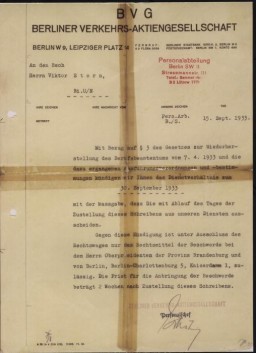You searched for: 广东11选五5真准网【欧宝体育qee9.com】9vpYA0Ku
<< Previous | Displaying results 251-300 of 407 for "广东11选五5真准网【欧宝体育qee9.com】9vpYA0Ku" | Next >>
-
Lublin/Majdanek Concentration Camp: Administration
ArticleIn 1940, the Nazis established Lublin (Majdanek) concentration camp in Lublin, Poland. Learn more about camp administration.
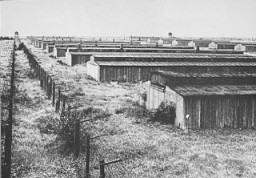
-
Reichstag Fire Decree
ArticleThe Reichstag Fire Decree of February 1933 restricted individual freedoms, and allowed Hitler's government to overrule state and local laws and overthrow state and local governments.
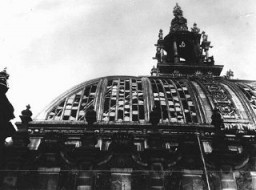
-
Josef Nassy
ArticleA Black expatriate artist living in Belgium upon the outbreak of WWII, Josef Nassy was held in German internment camps during the war. Learn about his experiences.
-
Althammer
ArticleThe Germans established the Althammer camp in September 1944. It was a subcamp of Auschwitz. Read more about the camp's history and conditions there.
-
The Nuremberg Code
ArticleLeading German physicians and administrators were put on trial for their role during the Holocaust. The resulting Nuremberg Code was a landmark document on medical ethics. Learn more
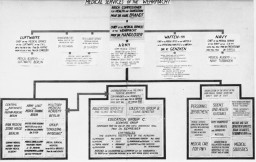
-
Mohamed Helmy
ArticleDr. Mohamed Helmy and Frieda Szturmann helped save a Jewish family in the heart of Nazi Germany. Helmy was the first Arab recognized as Righteous Among the Nations.
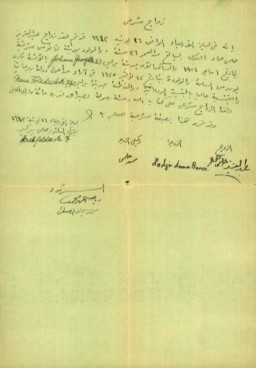
-
Janusz Korczak
ArticleJanusz Korczak ran a Jewish orphanage in Warsaw. He and his staff stayed with the children even as German authorities deported them to their deaths at Treblinka in 1942.
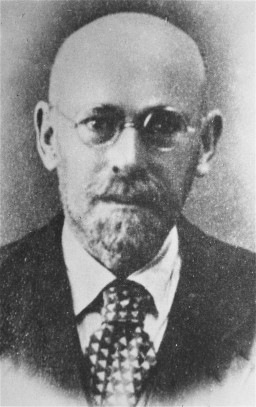
-
Anne Frank Born
Timeline EventJune 12, 1929. On this date, future diarist Anne Frank was born to Otto and Edith Frank. She would become a symbol for the children who died in the Holocaust.
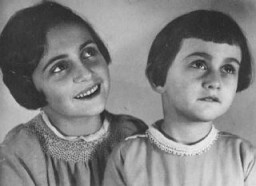
-
German Jews' Passports Declared Invalid
Timeline EventOctober 5, 1938. On this date, the Reich Ministry of the Interior invalidated all German Jews' passports and required them to have a "J" stamped on them.
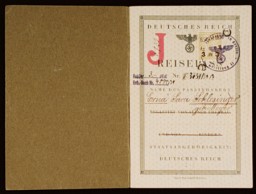
-
Benjamin Soep
ID CardBenjamin, called "Benno" by his family and friends, grew up in a religious Jewish household in Amsterdam. Benno's father, a successful diamond manufacturer, was president of the Amsterdam Jewish community. Benno had two younger sisters and enjoyed collecting stamps. 1933-39: After he obtained some work experience in a department store, Benno joined his father in the diamond business. Benno adhered strictly to Jewish law. He loved tennis and skiing, and in 1938, while skiing in Switzerland, he met a girl…
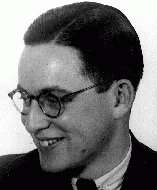
-
Friedrich-Paul von Groszheim
ID CardFriedrich-Paul was born in the old trading city of Lübeck in northern Germany. He was 11 when his father was killed in World War I. After his mother died, he and his sister Ina were raised by two elderly aunts. After graduating from school, Friedrich-Paul trained to be a merchant. 1933-39: In January 1937 the SS arrested 230 men in Lübeck under the Nazi-revised criminal code's Paragraph 175, which banned sexual relations between men. Friedrich-Paul was imprisoned for 10 months. In 1938 he was…
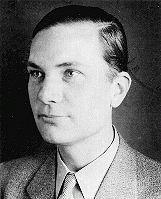
-
Annexation of Austria: The Anschluss
FilmIn an attempt to prevent the German annexation of Austria, Austrian chancellor Kurt von Schuschnigg called a plebiscite (referendum) on Austrian independence. On March 11, 1938, the Germans pressured Schuschnigg to cancel the plebiscite and resign. This German newsreel footage from March and April 1938 served as propaganda for the Nazi annexation of Austria. It begins with images of pro-Nazi residents in Graz expressing their opposition to Schuschnigg's plebiscite. It also includes footage after…
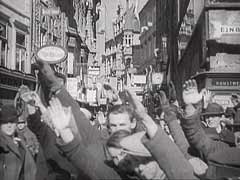
-
Miles Lerman describes returning to his hometown
Oral HistoryMiles Lerman was a Holocaust survivor, partisan fighter in the forests of Poland, international leader in the cause of Holocaust remembrance, and a "founding father" of the United States Holocaust Memorial Museum.
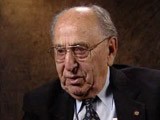
-
Operation Torch: The Anglo-American Invasion of French North Africa
ArticleOperation Torch was the Allied invasion of French Morocco and Algeria during the North African Campaign of World War II. Learn more.
-
Adolf Eichmann: Key Dates
ArticleAdolf Eichmann was a key figure in implementing the “Final Solution,” the Nazi plan to kill Europe's Jews. Learn more through key dates and events.
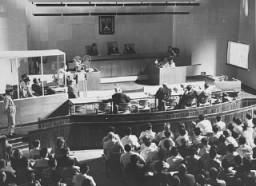
-
Liberation of Nazi Camps
ArticleThe liberation of concentration camps toward the end of the Holocaust revealed unspeakable conditions. Learn about liberators and what they confronted.
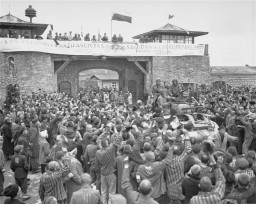
-
Polish Jewish Refugees in Lithuania: Unexpected Rescue, 1940–41
ArticleLearn more about the efforts of L.P.J. de Decker, Jan Zwartendijk, and Chiune Sugihara to help Polish Jewish refugees escape Lithuania during the war.
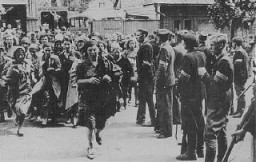
-
Liberation
ArticleThe first major Nazi camp was liberated by Allied troops in July, 1944. Learn more about liberation of camps towards the end of World War II.
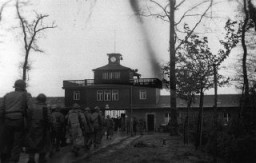
-
Death Marches
ArticleNear the end of WWII, the Germans began marching prisoners out of camps and away from the front. Read more about the brutal conditions of these death marches.
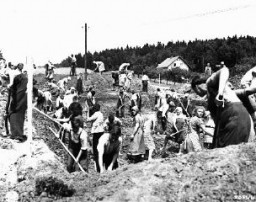
-
The Survivors
ArticleSurvivors faced huge obstacles in rebuilding their lives after the devastation of the Holocaust years. Learn about some of the challenges they faced.
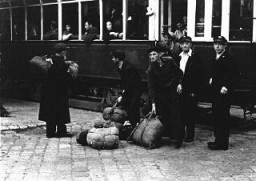
-
1938: Key Dates
ArticleExplore a timeline of key events in the history of Nazi Germany during 1938.
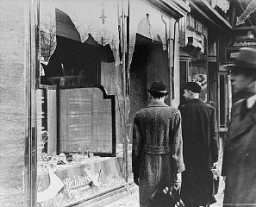
-
Letter from Elkhanan Elkes
Timeline EventOctober 19-November 11, 1943. On this date, Elkhanan Elkes wrote his will. It was smuggled out of the Kovno ghetto and delivered to his children.
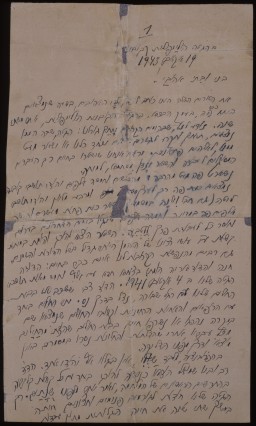
-
Ceasefire Ends Hostilities of World War I
Timeline EventNovember 11, 1918. On this date, a negotiated ceasefire ends the fighting of World War I when it goes into effect at 11am.
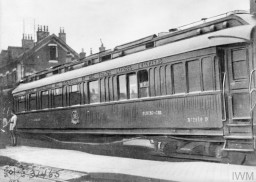
-
Hodonín U Kunštátu (Hodonín bei Kunstadt) (Roma camp)
ArticleIn March 1942, the Hodonin camp was classified as a camp for Roma. It was a transfer station during deportation to Auschwitz-Birkenau. Learn about the camp and its history.
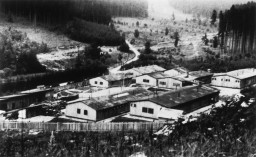
-
The Nazi Party
ArticleThe National Socialist German Worker’s Party, also known as the Nazi Party, was the far-right racist and antisemitic political party led by Adolf Hitler.
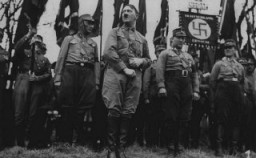
-
Auschwitz
ArticleThe Auschwitz camp system, located in German-occupied Poland, was a complex of 3 camps, including a killing center. Learn about the history of Auschwitz.
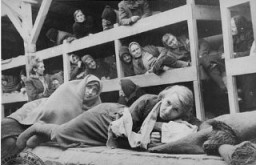
-
Peter Somogyi
ID CardPeter and his twin brother, Thomas, were the youngest of three children born to an observant Jewish family. They lived in Pecs, an industrial center where goods such as bricks and ceramics were produced. Peter's father owned a prosperous business selling accessories and parts for cars, motorcycles and bicycles. He was also a regional sales representative for Ford automobiles. 1933-39: A German nanny took care of Peter, Thomas, and their older sister. She taught them German and they became quite fluent.…
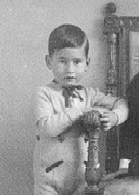
-
Pinchas Galperin
ID CardPinchas was one of 16 children born to a Jewish family. Only nine of the Galperin children lived to adulthood. Pinchas' father worked as a typesetter for a Jewish newspaper and his mother ran a small grocery store. After World War I, Pinchas married Sara Bernstein and the couple moved to Siauliai, Lithuania, where they raised three children. 1933-39: Pinchas and Sara owned and ran a dairy store where they sold milk, butter and cheese that they bought from local farmers. Every morning they would rise early…
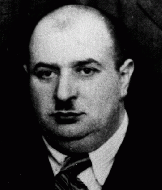
-
Wolfgang Lachman
ID CardWolfgang was the only son of observant Jewish parents living in Berlin. Though trained as a mechanical engineer, Wolfgang's father ran a wholesale kerchief and handkerchief business that he had taken over from his father-in-law. Wolfgang's family lived in an apartment above the business. They enjoyed vacationing at their country home in Neuenhagen, a suburb of Berlin. 1933-39: Wolfgang began school when he was 5; that year Hitler was named leader of Germany. Every morning they had to sing three songs: the…
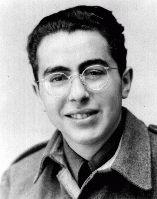
-
Hanandel Drobiarz
ID CardHanandel was raised with his three brothers and sisters in the town of Kozlow, where his family sold grain and livestock. The family was religious, and they observed the Sabbath and all Jewish holidays and dietary laws. When Hanandel was 5, he began studying Hebrew, the Bible, prayers, and Jewish history. 1933-39: At age 14 Hanandel was apprenticed to his uncle in Sosnowiec as a tinsmith. He worked for his uncle during the day and attended trade school at night. When he graduated from trade school he…
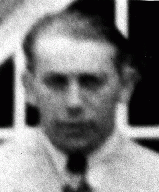
-
Johannes M. Lublink
ID CardJohannes was born to Christian parents and had three brothers and three sisters. His father sold coal for heating systems. By 1933, Johannes was also a coal distributor. Like many other Dutch citizens, Johannes did not approve of Hitler's policies. He especially objected to Hitler's persecution of Jews and Jehovah's Witnesses. 1933-39: Hitler's coming to power in Germany was a threat to all of them. In 1936, Johannes became a Jehovah's Witness. His mother was also a Witness and, by 1938, one brother and…
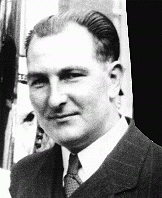
-
Yosel Coller
ID CardOne of six children, Yosel was raised in a religious Jewish family in Lodz, an industrial city in western Poland. His father was a businessman. At the age of 6, Yosel began attending a Jewish day school. His two older sisters attended public school in the morning and religious school in the afternoon. Yosel spent much of his free time playing soccer with his brothers. 1933-39: Yosel's family lived in a modest house in the northern section of Lodz. He went to a Jewish day school and had many friends there.…
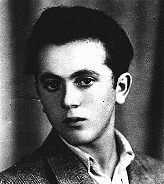
-
Machla Spicehandler Braun
ID CardRaised in Lowicz, Poland, in a religious Jewish family, Machla moved to Lodz when she married Jacob Braun. Her husband worked as a businessman and real estate investor. He became the landlord for an apartment building where he and his family also lived. Machla, a housewife, cared for their five children, who ranged in age from 5 to 15. 1933-39: Machla worked as a volunteer for the Zionist cause. The Brauns were a close family, and Machla's daughters Lena and Eva held their weddings in the Braun's large…
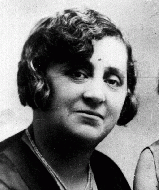
-
Helene Melanie Lebel
ID CardThe elder of two daughters born to a Jewish father and a Catholic mother, Helene was raised as a Catholic in Vienna. Her father died in action during World War I when Helene was just 5 years old, and her mother remarried when Helene was 15. Known affectionately as Helly, Helene loved to swim and go to the opera. After finishing her secondary education she entered law school. 1933-39: At 19 Helene first showed signs of mental illness. Her condition worsened during 1934, and by 1935 she had to give up her…
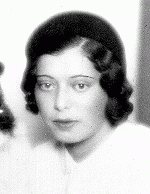
-
Siegfried Wohlfarth
ID CardThe elder of two sons of religious German-Jewish parents, Siegfried grew up in the city of Frankfurt. Upon completing his education, he became a certified public accountant in Frankfurt. In his free time he worked as a freelance music critic. While on a vacation in 1932 on the North Sea island of Norderney, he met Herta Katz, a young woman with whom he quickly fell in love. 1933-39: The Nazis had fired Siegfried from his government job because he was Jewish. Although his mother opposed the match,…
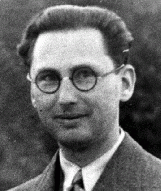
-
Chaim Engel
ID CardChaim's family came from a small town where his father owned a textile store. When antisemitic pogroms broke out in Brudzew, the Engels moved to the industrial city of Lodz. Chaim was then 5 years old. In Lodz he attended a Jewish school that also provided a secular education. After finishing middle school, Chaim went to work at his uncle's textile factory. 1933-39: Chaim's neighborhood in Lodz was predominantly Jewish, so most of his friends were Jews. As a young adult he began his compulsory army…
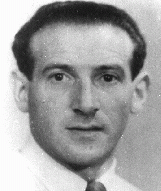
-
Maria Sava Moise
ID CardMaria was one of four children born to poor Roma ("Gypsy") parents in the capital of Moldavia in eastern Romania. The family lived in a mixed neighborhood that included Romanians and Roma. Maria grew up in a house with a yard where the family kept a pig and some chickens. Her father made a living by singing and by working at some of the many wineries that dotted the Moldavian countryside. 1933-39: Maria's parents couldn't afford to send her to school. To help make ends meet, Maria, her sister and older…
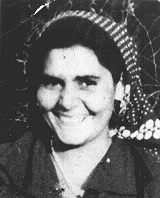
-
Ceija Stojka
ID CardCeija was the fifth of six children born to Roma ("Gypsy") parents who were Roman Catholic. The Stojka's family wagon traveled with a caravan that spent winters in the Austrian capital of Vienna and summers in the Austrian countryside. The Stojkas belonged to a tribe called the Lowara Roma, who made their living as itinerant horse traders. 1933-39: Ceija grew up used to freedom, travel and hard work. Once, her father made her a skirt out of some material from a broken sunshade. She was 5 years old and…
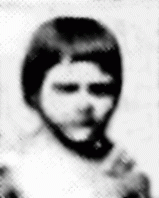
-
Johanna Niedermeier Buchner
ID CardJohanna was born in Vienna when it was still the capital of the Austro-Hungarian Empire. Her Christian family experienced the disruption resulting from the empire's collapse, as well as the instability of the Austrian republic. The depression of 1929 hit Vienna especially hard. In 1931 Johanna became a Jehovah's Witness. 1933-39: Johanna traveled constantly in and out of Austria distributing our Jehovah's Witness literature. In March 1938 Germany annexed Austria and her family was subjected to Nazi law;…
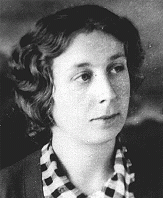
-
Monique Jackson
ID CardMonique's Jewish parents met in Paris. Her father had emigrated there from Russia to study engineering, and her mother had come from Poland as a young child. Monique's father did not have enough money to finish university, so he went to work as an upholsterer. He also shared a small business which sold his hand-tooled leather purses. 1933-39: Monique's mother was 20 when she gave birth to Monique in 1937. Two years later, Parisians were threatened by the possibility of bombing by the Germans, and French…
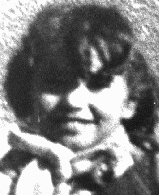
-
Nelly Adler
ID CardNelly was the youngest of three daughters born to Jewish parents in Liege, a French-speaking industrial city in eastern Belgium. Her Yiddish-speaking parents had moved there from Czechoslovakia a year before Nelly was born. The Adlers were one of only a few Jewish families in the largely Catholic city. Nelly grew up speaking French with her friends at school. 1933-39: The Adler's apartment was above a cafe and across the street from a Catholic church. Her parents ran a successful tailoring business from…
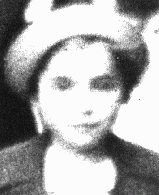
-
Sara Galperin
ID CardSara, born Sara Bernstein, was one of six children in a Jewish family in the Lithuanian village of Karchai. Her father was a farmer. Sara attended secondary school in Jonava and in 1920 she moved to Siauliai, where she met and married Pinchas Galperin. The couple owned and ran a dairy store, selling butter, milk and cheese. They had three children--two sons and a daughter. 1933-39: In addition to running the family store and rising early every morning to buy dairy products from the local farmers, Sara was…
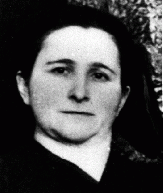
-
Lucien-Louis Bunel
ID CardLucien was the fourth of eight children born to poor Catholic parents in a small town in northwestern France. Lucien began his seminary studies in nearby Rouen at the age of 12. Following two years of military service, he resumed his religious studies in 1922 and was ordained as a priest three years later. He joined the Carmelite religious order in 1931, and became Father Jacques. 1933-39: In 1934 Father Jacques moved to the town of Avon, where he established a boys' school,…
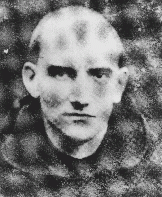
-
Rachela Rottenberg
ID CardThe younger of two children born to Jewish parents, Rachela grew up in Radom, an industrial town located some 60 miles south of Warsaw. One-quarter of the city's 100,000 prewar population was Jewish. Rachela's father was a Zionist and was active in municipal affairs. Her mother did volunteer work. l933-39: Germany invaded Poland on September 1, 1939. On September 5, with the Germans rapidly advancing, Rachela's family sought temporary safety with relatives in Warsaw. They got separated along the way.…
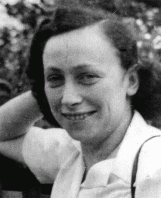
-
Jeno Gabor Braun
ID CardThe son of a rabbi, Jeno was raised in the town of Sighet in Transylvania. The region was multi-ethnic, and Jeno grew up in a family that knew Yiddish, Hungarian, Romanian, German and Hebrew. During World War I, when Sighet was near the front, Jeno's family fled to Hungary. There Jeno met Eszter Mendel, whom he married after the war. The couple settled in the town of Cristuru-Secuiesc in Romania. 1933-39: As a jeweler, Jeno is one of only two watchmakers in Cristuru-Secuiesc; the other is a German who…
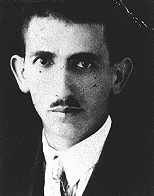
-
Robert Gruber
ID CardRobert was raised by Hungarian-speaking parents in Kosice, a town in eastern Slovakia with a sizable Jewish community of 7,000. The Grubers were a traditional Jewish family and they observed the Jewish Sabbath, dietary laws, and holidays. Robert's father owned a small jewelry shop. 1933-39: When Robert was 5, Kosice was taken over by the Hungarians, who were led by a dictator named Horthy. He stood on the main street with his parents, watching the soldiers march into town in a victory parade. They were…
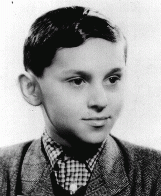
-
Pearl Harbor
ArticleJapan’s aerial attack on Pearl Harbor changed many Americans' attitudes toward involvement in WWII. Learn more about the events, facts, and background info.
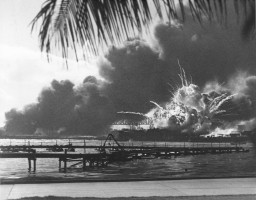
-
Ruth Gabriele Silten
ID CardGabriele was the only child of Jewish parents living in the German capital of Berlin. Her grandfather owned a pharmacy and a pharmaceuticals factory, where Gabriele's father also made his living. 1933-39: In 1938 the Nazis forced Ruth's grandfather to sell his factory and pharmacy for very little money to an "Aryan" German. After that, her father decided they should move to Amsterdam where it was safer for Jews. She was 5 years old and wanted to stay in Berlin. She didn't understand why she had to leave…
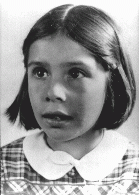
-
Ernst Silten
ID CardErnst was one of five sons born to a Jewish family in the Prussian city of Koenigsberg. He studied pharmacy and earned his doctorate in the late 1880s. Ernst spent several years as an apprentice before buying his own pharmacy in Berlin. Later, he also acquired a pharmaceuticals factory and supplied oxygen to hospitals. He married Marta Friedberg and the couple raised two sons. 1933-39: In Berlin, Ernst and his family lived in an apartment above their pharmacy and factory. In 1938 Ernst was forced to sell…
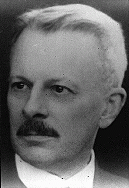
-
Dismissal letter from the Berlin transit authority
DocumentA letter written by the Berlin transit authority (Berliner Verkehrs Aktiengesellschaft) to Viktor Stern, informing him of his dismissal from his post with their agency as of September 20, 1933. This action was taken to comply with provisions of the Law for the Restoration of the Professional Civil Service. On April 7, the German government issued the Law for the Restoration of the Professional Civil Service (Gesetz zur Wiederherstellung des Berufsbeamtentums), which excluded Jews and political opponents…
